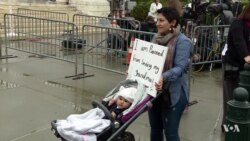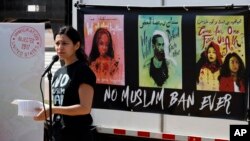The U.S. Supreme Court appeared to be leaning toward upholding President Donald Trump's travel ban limiting travelers from mostly Muslim-majority countries--Iran, Libya, North Korea, Syria, Venezuela, Somalia and Yemen-- from coming to the U.S.
During a hearing Wednesday, Chief Justice John Roberts and Justice Anthony Kennedy both signaled support for the policy. A vote would be needed from either one to shift the court in favor of the plaintiffs.
WATCH: Supreme Court Hears Arguments in Travel Ban Case
Since taking office, Trump has issued three versions of his travel ban since taking office. The previous two versions were temporary. The current ban has no expiration date.
The so-called travel ban spent most of last year in and out of courts where its legality was called into question by immigration advocates who say the ban amounts to a Muslim ban. It still faces the ultimate challenge in the Supreme Court.
The plaintiffs in the case — the State of Hawaii, the Muslim Association of Hawaii and three individuals — are expected to argue that the ban discriminates against the Muslim community, and exceeds presidential power over immigration.
In return, U.S. attorneys will argue the president has authority over immigration. Ahead of the hearing, Attorney General Jeff Sessions issued a statement saying "President Trump determined this travel order is critical to protecting the American people. We look forward to defending the order’s lawfulness today in the Supreme Court."
To support plaintiffs, Yemeni-Americans may shut down their businesses to protest of the president’s ban. Travellers from Yemen are prohibited by the ban. According to the Yemeni American Merchants Association web site, owners of bodegas, shops, and grocery stores will close between 12 p.m. to 8 p.m. on Wednesday in support of neighbors, workers, and families members affected by the ban.
"Bodega owners across the country call on their neighbors to stand with them and their workers outside their stores to show that America is bigger than this, that we are better when united than we we allow bigoted policies to divide us," according to a statement from Yemeni American Merchants Association.
But one country that was added in September has come off the list: Chad. It was taken off early April. Trump said in a proclamation the African country had improved its security measures making its passports "more secure" and improving its information sharing with the U.S. on known or suspected terrorists.
The other seven countries, however, "did not make notable or sufficient improvements in their identity-management and information-sharing practices" and remain on the list.
A ruling in the case is expected by the end of June.




























